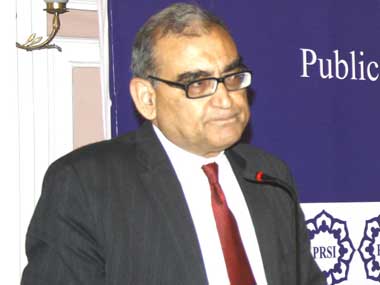“The media is not justified in giving 90 per cent of its coverage to entertainment leaving only 10 per cent to real issues which are basically socio-economic in nature. Doubtless, the media should provide some entertainment. But the thrust of its coverage should be in public interest. You have lost your sense of proportion,” said Justice Katju at a lecture on ‘The Role of Media in India’, organised by the Public Relations Society of India. Justice Katju is certainly providing news media some entertainment by pronouncing judgement on Sunny Leone’s stint at the Bigg Boss house. Commenting on Sunny Leone’s appearance on the reality show, Press Council of India (PCI) chairperson justice Markandey Katju on Monday said her past should not be held against her if her behaviour in India is “socially acceptable”. [caption id=“attachment_177783” align=“alignleft” width=“380” caption=“Why does Justice Katju’s opinion on Sunny Leone matter at all? Image courtesy: PIB”]
 [/caption] “Sunny Leone was earning her livelihood in USA in a manner acceptable in that country, though it is not acceptable in India. Hence if she conducts herself in India in a manner which is socially acceptable in India and does not breach the social moral code in India, we should not treat her as a social outcast,” Katju said in a statement. Why does Justice Katju’s opinion on Sunny Leone matter at all? What appears on entertainment channels is outside the remit of the PCI, which is mandated only to oversee (print) news media. Indeed, Justice Katju is stepping
on the toes of the Broadcast Content Complaints Council (BCCC)
, the independent regulatory body that oversees all content on television other than content which has been certified by the Censor Board. It is for them to decide whether Sunny Leone should or should not appear on entertainment channels. The BCCC received over 3,000 complaints against Sunny Leone’s appearance on Bigg Boss. “We did receive a complaint from BCCC regarding participation of Sunny Leone in Bigg Boss Season 5, and appeared before BCCC and clarified our position. BCCC agreed with our position that content on the show is in compliance with self-regulatory guidelines,” said Colors. That’s the only certification that matters — the BCCC’s certification. Not Justice Katju’s. His opinion on the subject is ads material as that of a lay person. Going by his own views on news media, Justice Katju’s comments on Sunny Leone should not even have been covered by news media. Are his comments important? No. Is Sunny Leone a ‘real’ issue that is ‘basically socio-economic in nature’? No. His comments are comments on entertainment, a vertical which receives far more coverage than Justice Katju believes that the vertical deserves. When the BCCC comments on Sunny Leone, its comments are not on entertainment, they are on the regulation of entertainment. Justice Katju might have an opinion on many and all issues. Only when he comments on the press are his views newsworthy; coverage of his comments on anything else, is, by Justice Katju’s own standards, irresponsible at best. Unless, of course, the coverage is in the entertainment pages.
[/caption] “Sunny Leone was earning her livelihood in USA in a manner acceptable in that country, though it is not acceptable in India. Hence if she conducts herself in India in a manner which is socially acceptable in India and does not breach the social moral code in India, we should not treat her as a social outcast,” Katju said in a statement. Why does Justice Katju’s opinion on Sunny Leone matter at all? What appears on entertainment channels is outside the remit of the PCI, which is mandated only to oversee (print) news media. Indeed, Justice Katju is stepping
on the toes of the Broadcast Content Complaints Council (BCCC)
, the independent regulatory body that oversees all content on television other than content which has been certified by the Censor Board. It is for them to decide whether Sunny Leone should or should not appear on entertainment channels. The BCCC received over 3,000 complaints against Sunny Leone’s appearance on Bigg Boss. “We did receive a complaint from BCCC regarding participation of Sunny Leone in Bigg Boss Season 5, and appeared before BCCC and clarified our position. BCCC agreed with our position that content on the show is in compliance with self-regulatory guidelines,” said Colors. That’s the only certification that matters — the BCCC’s certification. Not Justice Katju’s. His opinion on the subject is ads material as that of a lay person. Going by his own views on news media, Justice Katju’s comments on Sunny Leone should not even have been covered by news media. Are his comments important? No. Is Sunny Leone a ‘real’ issue that is ‘basically socio-economic in nature’? No. His comments are comments on entertainment, a vertical which receives far more coverage than Justice Katju believes that the vertical deserves. When the BCCC comments on Sunny Leone, its comments are not on entertainment, they are on the regulation of entertainment. Justice Katju might have an opinion on many and all issues. Only when he comments on the press are his views newsworthy; coverage of his comments on anything else, is, by Justice Katju’s own standards, irresponsible at best. Unless, of course, the coverage is in the entertainment pages.
Anant Rangaswami was, until recently, the editor of Campaign India magazine, of which Anant was also the founding editor. Campaign India is now arguably India's most respected publication in the advertising and media space. Anant has over 20 years experience in media and advertising. He began in Madras, for STAR TV, moving on as Regional Manager, South for Sony’s SET and finally as Chief Manager at BCCL’s Times Television and Times FM. He then moved to advertising, rising to the post of Associate Vice President at TBWA India. Anant then made the leap into journalism, taking over as editor of what is now Campaign India's competitive publication, Impact. Anant teaches regularly and is a prolific blogger and author of Watching from the sidelines.
)